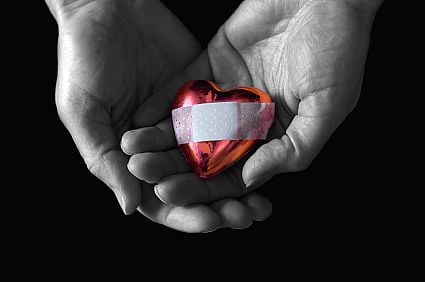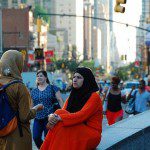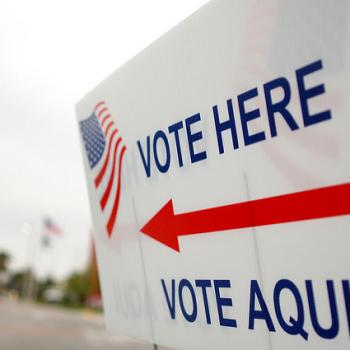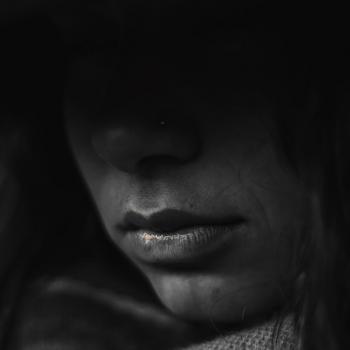
This is Day 29 of the 2018 #30Days30Writers Ramadan series.
What does community care look like for us during a time when our communities are being tried with loss, injustice, separation from families and communities? How are we showing up and caring for one another in the Prophetic tradition of mercy, compassion, love and firmness?
O you who covers himself [with a garment], Arise and warn [74:1-2]
This Ramadan, I am reflecting on the recent deaths of Anthony Bourdain, Kate Spade, the French man in Mecca and Luis Castaneda, as well as non-suicide losses of the year. We often pray we make it to Ramadan, to the last 10 nights, and in this privilege, I cannot help but think about those who have not survived: The daughters, the parents, the siblings and the unborn children we lost along the way as we reach the end this blessed month.
And We will surely test you with something of fear and hunger and a loss of wealth and lives and fruits, but give good tidings to the patient, Who, when disaster strikes them, say, “Indeed we belong to Allah, and indeed to Him we will return [2:155-156]
I think of those who are barely surviving. Those who may not feel the fruits and blessings of Ramadan and community in the way it is often so lovingly spoken about. The alienation and sense of belonging not always gifted to new Muslims, Muslims who identify alongside the LGBTQ community, survivors of assault, mothers managing post-partum depression, or those wrongfully accused and unable to pay for bondage out of prison.
Believers in their affection, mercy, and compassion for each other is that of a body. When any limb aches, the whole body reacts with sleeplessness and fever
I think about a professor I had in college, who saw my grades dip and had the courage to ask how I was doing. Who did not let me leave her office until I called the counseling center at my university. I think about my sister and her friends spending their first Ramadan as adults, some alone, some newly married, all the adjustment both situations bring. I think about women and children seeking refuge in the margins of the Chicagoland community — working multiple jobs and navigating systems in a new country.
I think about South Asian and Latino men, who are not Muslim, who face bigotry and harassment for looking a certain way. I think about Sudanese cab drivers wondering about their livelihood with the advent of Lyft and Uber. And, I think about a powerful statement by Mahdia Lynn, founder of Masjid Al-Rabia — that the truth of Islam is too great to deny anyone.
Our religious tradition honors inclusion, difference and the unique strengths of everyone who chooses to accept Allah (swt) and Muhammed (saw) as His messenger. How and when did we become so harsh with one another that we are unable to hold each other when we fall, that we cannot see and spend time with each other when we are hurt and struggling?
We have created you male and female, and appointed you races and tribes, that you may know one another. Surely the noblest among you in the sight of God is the most God-fearing of you. God is All-knowing, All-aware [49:13]
Ramadan forces me to slow down. The magnification of what my life is like sacrificing, submitting and remaining God-conscious in the way that I can for a month speaks to one of the most challenging parts of Ramadan for me — making choices about my time, my commitments to myself and others and my willingness to create and be in community.
And so, as I learn about the nuances of our community and the struggles I have not seen, heard or experienced because of my privilege, I am taken aback. My ability to stay hopeful for the ummah wavers as I consider the ways in which I have been ignorant and complicit in making others feel unwelcome, undesired or less than because of the way they practice, dress or behave.
This ignorance is reminiscent of one of the origin stories in our faith — Satan’s refusal to bow to Adam. We are told the refusal of the jinn, Iblis, to prostrate to Prophet Adam was because Iblis believed he was better than Adam — stating “I am better than him. You created me from fire and created him from clay.” [38:76] Allah (swt) banishes Iblis from heaven after this, suggesting the story of original sin is not of Adam and Hawa’s forgetfulness but of Satan’s arrogance — a sense of being “better than.”
Legal scholars at Karamah suggest this is our tradition’s first instance of power/control, domination/oppression.
And so, this Ramadan, I am reflecting on our collective responsibility to each other to manage this arrogance. To care for each other, support each other and facilitate each other’s healing, instead of engaging in religious policing, shaming and alienating. I pray we are able to for each other, to remember stories in our tradition, which highlight a non-judgmental turning towards the humanity of other as well as the scholarship, empowerment and elevated status of Muslim women, such as the story of slander of Aisha (RA) and the prostitute granted Jannah for showing kindness to a dog.
I pray you will join me in financially supporting the organizations and activists behind the scenes at Muslim Anti-Racism Coalition, Believers Bail Out, RAHMA, Karamah, HEART Women & Girls, Muslim Wellness Foundation and Masjid Al-Rabia. They teach me that spiritual elevation does not come from sitting in the minbar, but by working alongside those who do (and do not) visit the mosque.
They model how to examine who is the in the room and why; who is not in the room and why not. I know, through their example, what I must do more to be inclusive of my brothers and sisters in Islam and humanity, regardless if they look, speak, act differently or have other experiences as me. And, I realize, like Adam and Hawa, that I will make mistakes and must ask for forgiveness.
But I also think about the fear inherent in investigating the ugliest parts of myself, of putting language to toxic and joyful experiences, and the acceptance that I have so much more to learn. My experiences in therapy (both as a clinician and client) have demonstrated to me the difficulty and courage required to be willing to be vulnerable and to talk openly about individual and collective “not knowing.”
Unpacking the shame in not knowing, in asking for help to understand, in doing the work to connect and create community, in talking about my feelings and existential questions related to pain, heartbreak, loneliness, achievement and purpose is humanizing and necessary to live a meaningful and worthy life. As I try to embrace the softness of my own humanity and what others might consider naivety that the world can be better, I also try to find hope that in disclosing the more intimate, vulnerable sides of me I might find healing.
Collectively, I wonder how as believers of justice, compassion and mercy, how we can BE BETTER — softer, as well as more accountable, to one another? I wonder what we each need to learn about ourselves and how we want to behave to create equitable and inclusive Muslim communities. By cultivating empathy, in working together, in sitting in stillness and silence, I hope we are able to work through interpersonal and — particularly in a time of heightened threats of Islamophobia, xenophobia and homophobia.
I’ve been able to explore these reflections because of the leaders in the organizations mentioned above. I continue to navigate these reflections interpersonally within my graduate school community and my family. And, I share this with you in hopes you will join me in examining what it means to care for ourselves and our communities. I believe the values of mercy, compassion, forgiveness, standing for justice and honoring the rights of others are at the core of our faith tradition.
We have a responsibility toward each other, the Earth, and the Earth’s non-human inhabitants. Will you join me in embracing not knowing, not assuming, in coming from a place of non-judgmental curiosity, in smiling, in saying salaam, and extending a conversation to your neighbor in salah this evening?













